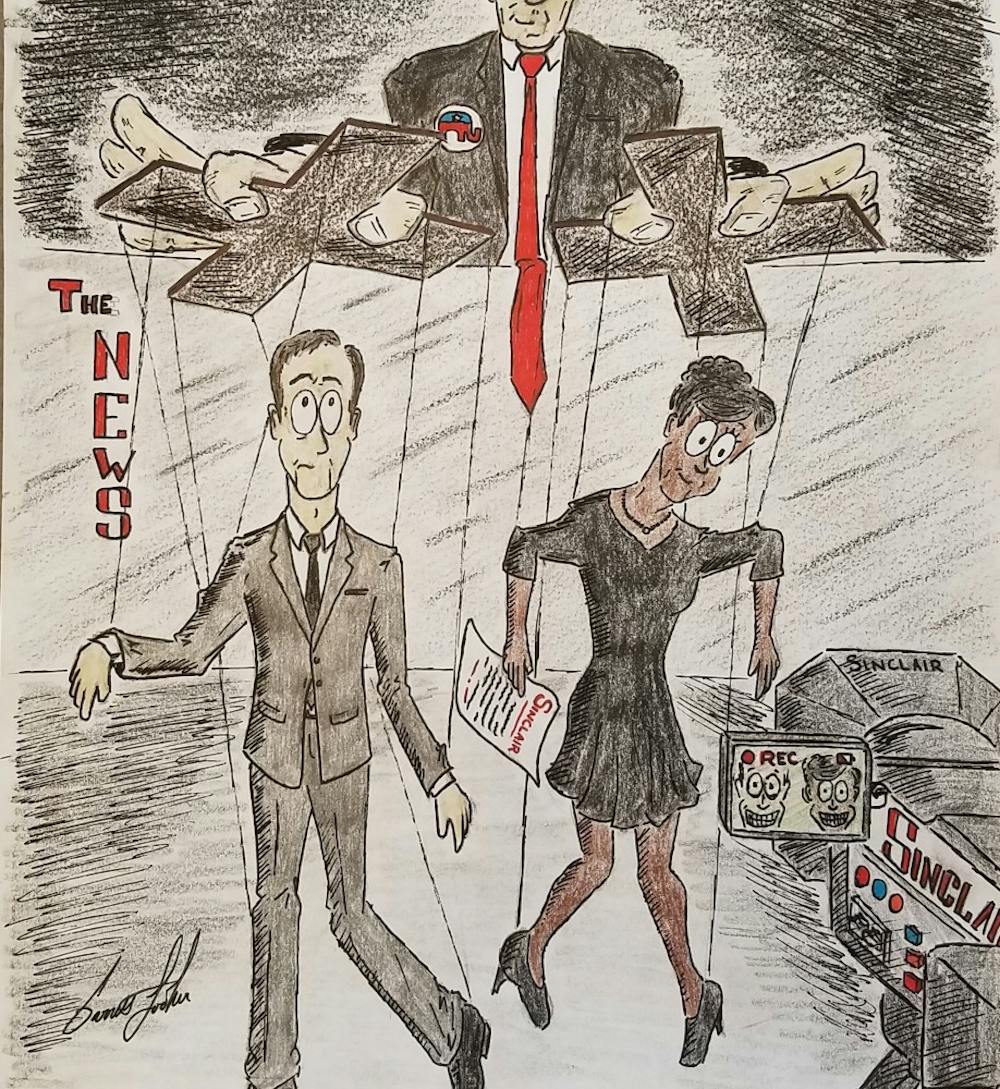Evan Hatfield is a sophomore journalism major and writes "Never Being Boring" for The Daily News. His views do not necessarily agree with those of the newspaper. Write to Evan at erhatfield@bsu.edu.

One of the biggest issues in the world of news as of late is a company that may soon have control of two major Indiana TV stations.
The name Sinclair Broadcast Group has slowly risen to prominence over the past year. The company has gained attention for the insertion of the company’s right-wing views into local news broadcasts through a number of methods.
Their latest effort was a corporate mandate that led to dozens of anchors across the country being required to read a slanted message about “biased and false news.” A video with many of the resulting editorials being played over each other has been making the rounds for more than a week.
It’s chilling, perhaps even dystopian to watch. It’s the sort of thing I might expect to see in a sci-fi film or even a bad dream. But no, it’s very real.
This happening on even one station would be disconcerting. But what about when it's happening on 173 stations across the country? And what if that number could be about to jump even further?
Sinclair announced its intent in May of last year to purchase Tribune Media in a $3.9 billion deal, which would allow it to push its station count over 200 and expand its reach into major cities such as Chicago. They’d also gain control of CBS4 and Fox 59 in Indianapolis.
And though the viewers might not notice the change, that new ownership could have significant ramifications for local television news.
It’s worth bearing in mind more people use local TV news than any other news source, according to a Pew Research Center study from late last year.
That means there’s many people who get information about local politics and other important issues from their local newscasts that they otherwise might not hear about at all.
With Sinclair in control, they still might not find out about those stories. A new study from Emory University in Atlanta found that local news on stations owned by Sinclair increased coverage of national politics by 25 percent at the expense of local political coverage.
Consider that Sinclair owns dozens of what are supposed to be local news operations. Often, those stations are operating in areas where the local newspaper is a thing of the distant past.
So if those newscasts stop covering issues that particularly matter to the community, who’s left to speak up for the people? Being able to have some idea of what’s going on in the world around us is a significant part of what makes democracy work. Without that, we’re left in the dark in a sea of confusion. An informed democracy can’t survive in those conditions.
And while it’s not necessarily a bad thing that they’re bringing up national politics more, it’s problematic when stations across the country are being required to insert what are essentially conservative opinion pieces into local newscasts that people have come to trust.
Odds are, people won’t even notice that opinion is being injected into what should be objective newscasts. That could have massive ramifications, even more so than the talking points in other conservative media outlets such as Fox News.
One line from the script those anchors had to read about "fake news" was that “this is extremely dangerous to our democracy.” They’re right — but not in the sense Sinclair may have intended.
The question then becomes, “What can we do about it?” And sure, it may seem hopeless, what with this being a multi-billion dollar company with no signs of slowing down. But it isn’t.
Opposition to what Sinclair is doing has been building over the last few days. Amy Schumer is avoiding interviews with Sinclair stations in promoting her new movie. Watchdog groups are buying anti-Sinclair ads to shed more light on what the company does. Political candidates across the country are calling for boycotts of the company.
But it goes beyond Sinclair. Disinformation still runs rampant even without them. Above all, the best thing anybody can do is pay more attention to the sources we get our news from. Are they fair? Are they accurate? Are they reliable?
My goal as a journalist has always been to present the truth. If we’re not able to do that, who will?
So get informed. Get curious. Demand nothing less than the truth. Our democracy depends on it.





